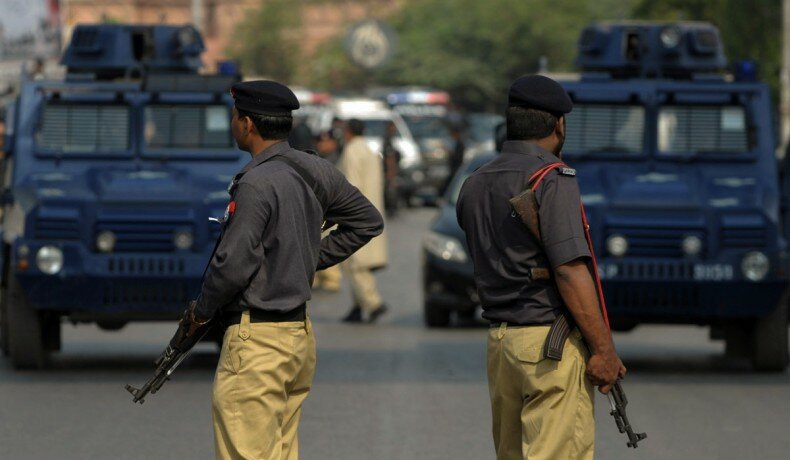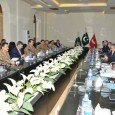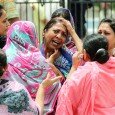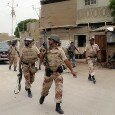By Zulfiqar Kunbhar –
Under al-Qaeda, three separate groups of highly-trained and motivated terrorists associated with banned Jihadi organizations are attacking and murdering police officials in Karachi, especially in West, Central and Malir districts, says CID city Chief Umer Khattab
It was around 11:15 pm on January 7. Sajid Hussain was standing at Naziamabad Board Office stop Karachi, when suddenly his mobile phone rang. The caller had no good news to share. ‘Hello, hello, Chanda ko goli lagi hai. Abbasi Shaheed Hospital le kar gayai hein (Chanda has received bullet. They have taken him to Abassi Shaheed Hospital),’ caller informed. Sajid rushed to hospital but when he reached there, it was too late. Chanda was no more.
“Chanda was nick name of my younger brother Aamir Shah who served as a police Head Constable”, said Sajid brother of slain cop who lost his life in bullet wound just before Sajid received the call. In media reports, Head Constable Aamir Shah and an alleged robber were shot dead in Orangi Town in an encounter between police and suspects.
“We have not forgotten the grief and loss of Aamir. After the tragic incident, my mother now helpless to take sound sleep,” said Sajid with tears in his eyes.
Aamir who joined police in 1988, left the world with 40-yard house in Orangi Town for his widow besides three sons and two daughters. Forty sex years old cop was about to get promotion to become an ASI before his death. “My brother had no dispute with anyone. He was brave as he got bullet on his chest,” said Sajid mentioning Aamir’s son eighteen years old Syed Hasnain Shah, intended to join police force and wanted to serve the country like his father.
Sindh Police announced Rs 2 million compensation for Aamir’s family besides a plot and assured appointment one of his children in police force. “Money is not everything. We want justice. We want to see murderer behind the bars,” said Sajid.
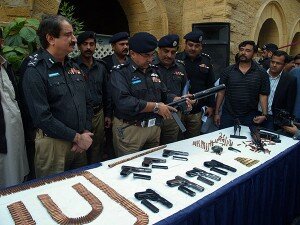 This is not the story of sole martyred Aamir Shah or his brother Sajid who is also ASI in police. The police are facing threats and targeted attacks increasing on regular basis. According to Karachi Police spokesman Ateeq Shaikh, number of police martyrs in 2014 stood at 143. Whereas in 2015 till filing this story 18 policemen besides 2 Rangers personnel and a traffic constable had lost their lives in different attacks.
This is not the story of sole martyred Aamir Shah or his brother Sajid who is also ASI in police. The police are facing threats and targeted attacks increasing on regular basis. According to Karachi Police spokesman Ateeq Shaikh, number of police martyrs in 2014 stood at 143. Whereas in 2015 till filing this story 18 policemen besides 2 Rangers personnel and a traffic constable had lost their lives in different attacks.
“Many factors are involved behind the attacks on police force. Banned organizations, general criminals, political motivated, sectarian factor could be the reasons,” said additional inspector general Karachi Ghulam Qadir Thebo while talking to Pique. According to him, police officials have been ordered to be proactive, wear proper gear, stay close to place of posting. The force has also hired retired army men. Besides that incentive for cops working in hardship areas are also been awarded.
According to experts increase in attacks on law enforcers was most likely a retaliation move over hangings of terrorists and the passage of 21st Constitutional Amendment Bill and Pakistan Army (Amendment) Bill 2015. The police, particularly in Karachi West remained under threats. While on the other hand, according to Crime Investigation Department city chief Raja Umer Khattab’s views, “Under al-Qaeda, three separate groups of highly-trained and motivated terrorists associated with banned Jihadi organisations are attacking and murdering police officials in Karachi, especially in West, Central and Malir districts. In Khattab’s words information gathered by the CID’s ground operatives revealed these assassins belong to Lashkar-e-Jhangvi, Tehreek-e-Taliban Pakistan, its Swat chapter Jundullah and other groups.” CID city chief also reveals that al-Qaeda had young terrorists in Karachi and Hyderabad who regularly moved between the two cities to head three teams tasked with targeting police officials, adding the objective of these teams was to demoralise Karachi police, which was on the forefront of the operation against terrorists and there was also the revenge factor.
“We are highly vulnerable and regularly targeted,” said Sajid. “On the Soyam day of Aamir, I received a threatening call. The caller revealed me my name and my address. The difficulty for us as compared to attackers that police force cannot open fire ruthlessly like them in public,” remarked Sajid. “We have to care a lot. If we fire, people even do not hesitate to hold protest against us. Lest the people would not support us things would happen like Aamir case,” stated Sajid.
Sindh police has repeatedly raised demand for an increase in its current force for the Pakistan’s fastest-growing and most lawless city touching the population at around 20 million, is smaller than many of its counterparts in some large cities of the world and even lagged behind Lahore, a much small city than Karachi. The strength of Karachi police is around 30,000 whereas according to world standards it should be 70,000. According to Police Rules’ Chapter-2, the total strength of police for watch and ward should not ordinarily exceed one constable for every 450 inhabitants. A similar standard is employed internationally, which requires 222 policemen for 100,000 population.
According to officials, Karachi cops, especially head constables and constables are easy targets for trained terrorists because of the cops’ long duty hours, lack of anti-terror training and absence of protective gear, including bulletproof vests, steel helmets and small firearms. Most of the police officials killed last year and in the first month of the year 2015 were not wearing bulletproof vests, while many of them were shot in the head.
As the bubbling-up of the threat level, year 2014 saw ambush assaults of Police. The fallen policemen included CID SSP Chaudhry Aslam Khan, who died in a suicide attack riding in his vehicle with other police officials. The attack on the bus of Razzakabad Police Training Centre in Karachi did not only claim more than a dozen lives but also damaged fibre of many families and left many young children orphan. Shortage of bulletproof jackets, police mobiles and petrol makes police mobilisation limited. Besides there is an issue of police pay scale comparing with other provinces.
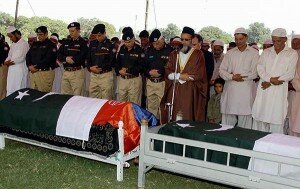 “Militancy, ethnicity and organised crime are the main challenges Karachi police is coping with,” says former inspector general Police Sindh Afzal Ali Shigri from 1993 to 1995. Since year 2000, organized crime has gone very high in Karachi apart from other big cities of world. Under police law that was introduced in Pakistan in 2000, all related problems were thoroughly addressed. Sindh was between the two provinces that changed the law later on. “Whether we agree or not, basic challenges Karachi police facing is ethnic conflict. Unfortunately political class did not allow running police law further. Government is asking police to face the challenges of 21st century but they have the same 19th century facilities and infrastructure,” said Shigri.
“Militancy, ethnicity and organised crime are the main challenges Karachi police is coping with,” says former inspector general Police Sindh Afzal Ali Shigri from 1993 to 1995. Since year 2000, organized crime has gone very high in Karachi apart from other big cities of world. Under police law that was introduced in Pakistan in 2000, all related problems were thoroughly addressed. Sindh was between the two provinces that changed the law later on. “Whether we agree or not, basic challenges Karachi police facing is ethnic conflict. Unfortunately political class did not allow running police law further. Government is asking police to face the challenges of 21st century but they have the same 19th century facilities and infrastructure,” said Shigri.
“Actually Karachi police is facing utmost challenges in Pakistan,” said the former police chief. “The way Karachi police are dealing with the situation in numerous awkward situations in terms of lacking facilities and threats is commendable. It is the responsibility of the government of today to provide due facilities to the police force. We also need to de-politicise the police,” said ex-IGP Sindh.
Despite facing hardships, Karachi police is often criticized as incompetent and corrupt. Karachi Targeted Operation launched in September 2013 against criminals and terrorists is time and again lamented for failing to produce ‘fruitful results’. Karachi police chief Ghulam Qadir Thebo in an interview admitted that it was not ‘100 per cent possible’ that all encounters were real “There were some incidents where encounters were not real. When I came to know about such cases, it was investigated and FIRs were registered against those officials who were found guilty,” stated Thebo.
“There are allegations on Karachi police when it comes to corruption,” said Riaz Sohail, multimedia journalist working with BBC News, based in Karachi. According to him to monitor the Karachi Targeted Operation it was decided to formulate the monitoring committee that could not be made possible. “Large scale complains appear regarding the violation of Human Rights including from political and religious parties,” Sohail opined adding that target killing on political and sectarian grounds has not stopped even today in Karachi. “Police claims that in pre-operation scenario the ratio of target killing was thirteen per day while today it has reduced to eight. This statement regarding the performance tells the story itself.”
![]() The writer is a Karachi based journalist. He works for Daily Times
The writer is a Karachi based journalist. He works for Daily Times





















































































